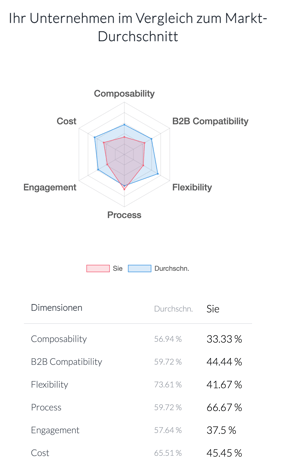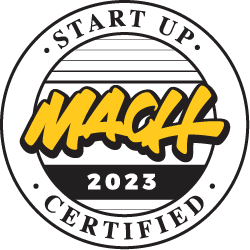Discover the weaknesses of your e-commerce platform!
- Fill out our anonymous survey in just 10 minutes
- Get the comparison with your industry peers immediately and see the results on a spider chart
- Get the report findings free of charge via e-mail
- Get an invitation for an exclusive webinar where we will present the industry-level report
- Upon request, we can provide a free personal consultation on how you can improve in the areas you underperform in.

Why is this Study Important?
Outdated, monolithic systems inhibit agility and innovation because changes require extensive testing and often involve downtime. With modern microservices-based software, changes can be implemented more frequently, efficiently and with less risk. However, replacing traditional systems is challenging, often caused by a lack of cloud knowledge and interoperability issues.
Clinging to outdated systems entails competitive disadvantages, loss of revenue and waste of resources. Companies cannot fully leverage their success factors. Developers are tied up in migration projects that have no value and lose their motivation. At the same time, high costs are incurred without ROI. Business models with peak loads bear a high total cost of ownership (TCO).
Phasing in Composable Commerce, a flexible, modern technology approach, removes outdated structures and processes. Microservices and API-first strategies ensure seamless integration and scalability. Adopting Composable Commerce allows companies to rid themselves not only of outdated technologies, but also of inefficient processes and organizational structures. It is an opportunity to apply modern design principles and methodologies throughout the enterprise. As a result, B2B companies become more adaptable and improve their innovation.
Composable Commerce reduces inefficient structures, increases agility and flexibility, and strengthens your market position. Through rapid adaptability and innovation, you improve your customer experience while reducing your TCO.
The 6 Most Important Evaluation Criteria:
Composability
Composability defines a flexible composite of digital business applications that work like building blocks - they can be added or replaced. These solutions are characterized by their ease of integration into modern MACH architectures - they are microservices-based, API-centric, cloud-native software-as-a-service, and headless. This structure promotes business agility and enables innovation. Rapid customization and experimental freedom are not only allowed, but actively encouraged, so that companies can quickly realize the benefits of such a system and continue to evolve.
B2B Compatibility
B2B Compatibility focuses on improving and optimizing B2B sales processes. This includes not only marketing aspects, but focuses in particular on efficient sales integration and administrative processes. It takes into account critical elements such as pricing, catalog management, discount strategies and chargebacks. It also highlights the importance of customer experience (CX), which is influenced by user experience (UX) and an intuitive user interface (UI). B2B Compatibility addresses the specific challenges of B2B companies with large sales teams and high revenue expectations.
Flexibility
Adaptability, maintainability and scalability are critical components for an agile and future-proof business environment in B2B commerce. The adaptability of a modular B2B commerce platform enables rapid response to new business requirements, peak loads and market trends - while avoiding vendor lock-in. Combined with special maintainability, this flexibility ensures that your cloud-native platform is always up to date. Updates are performed automatically in the background, significantly reducing manual effort. Downtimes are thus a thing of the past. By deploying system resources as needed, the cloud solution can deliver high performance and adapt seamlessly as your business grows. Together, these factors provide a strong foundation for driving business agility and innovation.
Dynamic Customer Engagement
This term represents an innovative, data-driven approach to customer interaction and simple process modeling in B2B commerce. The innovation here is data-driven process control, as business processes are not only analyzed and optimized based on data, but also dynamically changed and controlled. In contrast to conventional models based on static data, Dynamic Customer Engagement enables agile and proactive adaptation of customer journeys. By connecting customer preferences in the front office with business KPIs from the back office, personalized and compelling interactions with customers are created.
Business Process Maturity
This term refers to the extent to which a company has digitized and optimized its business processes. It is not an isolated project, but a continuous process of further development and transformation. The maturity of business processes directly influences a company's digitization strategy and can be seen as an indicator of the general level of digital maturity. A high level of business process maturity is reflected in an efficient, program-oriented organization that is able to respond to changing market requirements and thus increase success in the digital economy. By continuously improving its business processes, a company can increase its competitiveness and performance in the digital age.
Total Cost of Ownership
In terms of a B2B commerce, TCO means that only the required building blocks and performance should be calculated, resulting in an efficient and tailored cost model. This model is fair and transparent, with fixed monthly subscription fees and no hidden costs or upfront charges. Additionally, upgrades and maintenance are included in the fee, making it easier to control and plan costs. What makes this approach special is the differentiating feature of seasonality: as business volumes fluctuate, the platform dynamically adjusts to ensure that only the resources that are really needed incur costs. As a result, TCO represents a key variable in the perception of value for money and enables companies to clearly and comprehensively evaluate their IT investments.
Discover your Level of Digital Maturity
Our survey with an online assessment helps you identify your maturity level and the steps you can take to improve it. Prioritize action areas and take concrete measures to replace traditional solutions. Receive an individual roadmap for the step-by-step optimization of your systems and get a personal consultation, if required.Sponsors of the Research:
Emporix provides the leading cloud-native Digital Commerce Platform for B2B and sophisticated B2C in one solution.
Research sponsored by Emporix — a MACH Alliance certified member:


